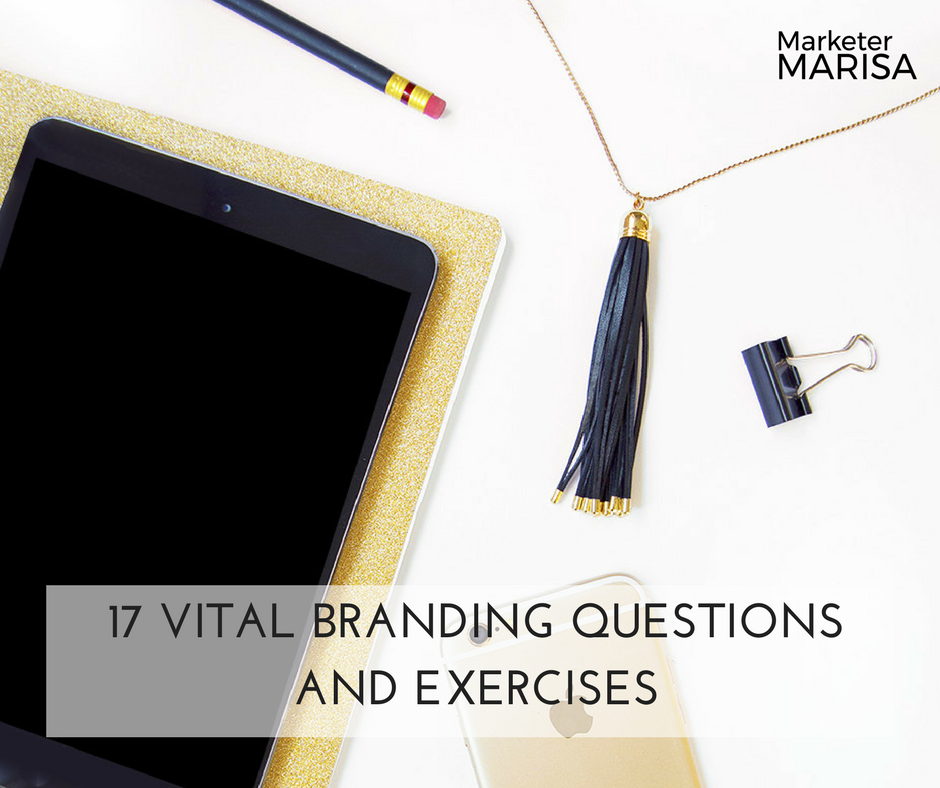17 Vital Branding Questions And Exercises
Your brand is a mixture of what you do and say and how you make people feel. Do you have a clear brand definition? Here are some questions that can help get you started on defining exactly what your brand stands for, who you're trying to reach, and the best ways to go about doing that.
Questions To Help Define Your Brand
1. What about your business inspires everyone in and outside of the organization to do what they do — and love doing it? This would be the "Why" discussed in my Simon Sinek post and, in my opinion, the most important question on this whole list.
2. What's your brand's story? This includes the standard who, what, when, where and they why, but take they why a little farther to share the role you play in your customer's life.
3. What are the five words that describe your brand? Or five words that you want people to see you as? What language have customers used to describe working with you or how you made them feel?
4. Define the set of characteristics that make up your brand's personality. (It may be helpful to think in terms of archetypes.)
5. If your brand was a celebrity or famous fictional character, who would it be? It can be a mixture of a few people, too! Who would they hang out with?
6. What principles are going to shape your company’s culture? What is your backbone made of? What’s negotiable and what is not? (Even if you are a solo business owner, you still work with other people who are customers, vendors, partners, and more. Knowing where you draw the line on any issues before a situation arises can help you respond in a tricky situation, especially if you need to act quickly.)
7. What does your brand offer that your competitors can't?
8. What is the value that you promise to deliver to the consumer? Similar to the question above, but different. (Refer again to the Simon Sinek post.) How does this impact the way they live their lives and actively make a difference?
9. What is your voice and tone? This is a good time to play this "This, Not That" game. For example: authoritative, but not bossy; fun, but not flighty; practical, but not basic. Also, look to your customers for inspiration; how to they speak and sound? They need to be able to understand and relate to you.
Which is the perfect segway into...
Questions To Discover Your Target Audience
10. Who is your perfect customer? Be specific and as surface and deep as you can get.
11. Who are your non-buyers? Who are the people who don't want your product, don't like your product, and will never, ever use your product?
12. Who are the people that influence your ideal customer? This can help you with your tone and personality, as well as help you possibly identify influencer collaborations in the future.
13. What pain points do you solve for your audience? This somewhat goes back to question #8. If people had perfect lives, they wouldn't be searching or even interested in your product or service. By identifying the reason why they are coming to you, you can shape your marketing strategy to satiate that need. Always be focusing on how you can help the customer.
14. Why do your customers come to you? Why do they trust you?
15. Build your Buyer Persona: Who are they, what do they do, where do they hang, where do they receive information from, how do they receive it, what do they want from a brand, how do they want to communicate with a brand, what is their budget and determination for value?
Questions To Get To Know The Market
During this phase, take note of any colors, font styles, graphics, images, website layout, blog content, page navigation, etc. that you like, hate, or notice a common theme.
16. Who is your direct competition?
17. Who are the brands within your industry that you think are doing really well? What about brands you admire outside of the industry?
Once you can answer these questions, you will start to have an idea of the visual representation of your brand that would relate best to your audience and portray the values you want to showcase. Is your brand a distinguished professor type or Harley-riding bad-ass? Are they a plant-loving sustainability enthusiast or a new, bigger, better Wallstreet go-getter? (Please don't ask me where these examples come from... but you get the idea.)
Let me know the funniest brand persona examples you've come up with in the comments below!







